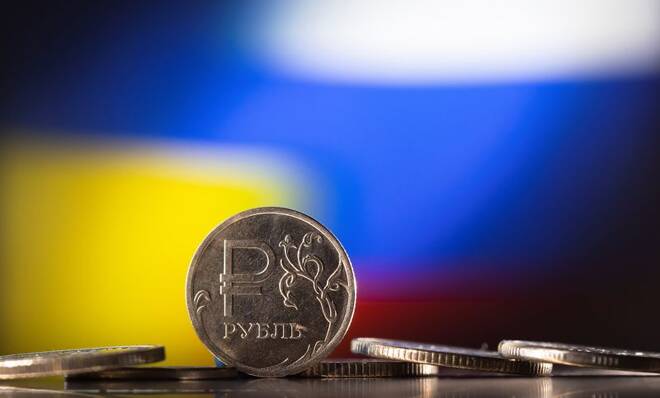Advertisement
Advertisement
Rouble weakens sharply from over 2-year high vs euro before long weekend
By:
(Reuters) - The Russian rouble strengthened to a more than two-year high against the euro on Friday and headed back towards 66 versus the dollar, supported by capital controls and weak forex demand, as the spectre of more sanctions against Moscow hung over markets.
(Reuters) -The Russian rouble dropped sharply on Friday, pulling back from a more than two-year high against the euro as the spectre of more sanctions against Moscow hung over markets ahead of a second consecutive long holiday weekend.
The European Union’s executive on Wednesday proposed the toughest package of sanctions yet against Russia for its actions in Ukraine, but several countries’ worries about the impact of cutting off Russian oil imports stood in the way of agreement.
By 1201 GMT, the rouble had lost 4.7% to trade at 73.45 versus the euro, falling sharply from its strongest point since February 2020 of 69.1250.
The rouble was 3.8% weaker against the dollar at 69.52 , not too far from a more than two-year high of 65.3125 hit on Thursday.
The rouble has rallied in the past few weeks thanks to mandatory conversion of foreign currency by export-focused companies. Also, there has been weak demand for dollars and euros amid waning imports and restrictions on cross-border transactions.
“It looks like the rouble has found a new equilibrium point around 67, at least for the time being,” said Sberbank CIB analysts in a note. “However, we think the local currency may begin to strengthen again when we come out of the May holidays next week, with exporters gradually beginning to step up their offers of hard currency.”
They said the rouble could strengthen to 60 against the greenback by the end of the month.
SberCIB Investment Research’s Yuri Popov expects the rouble to trade at 75 to the dollar at year-end, improving his forecast from April of 85.
Moves in the rouble are sharper than usual as market liquidity has been thinned by central bank restrictions designed to prop up financial stability after Russia sent tens of thousands of troops into Ukraine on Feb. 24.
Meanwhile, trading activity is subdued as the markets are open for only three days this week in the middle of Russia’s long May holidays.
Brent crude oil, a global benchmark for Russia’s main export, was up 1.7% at $112.8 a barrel.
Russian stock indexes were down.
The dollar-denominated RTS index was 3.7% lower at 1,078.1 points. The rouble-based MOEX Russian index was down 1% at 2,381.6 points.
Promsvyazbank analysts said they expected equity markets to drop ahead of another long holiday weekend.
(Reporting by ReutersEditing by Frank Jack Daniel, Mark Potter and Chizu Nomiyama)
About the Author
Reuterscontributor
Reuters, the news and media division of Thomson Reuters, is the world’s largest international multimedia news provider reaching more than one billion people every day. Reuters provides trusted business, financial, national, and international news to professionals via Thomson Reuters desktops, the world's media organizations, and directly to consumers at Reuters.com and via Reuters TV. Learn more about Thomson Reuters products:
Latest news and analysis
Advertisement
